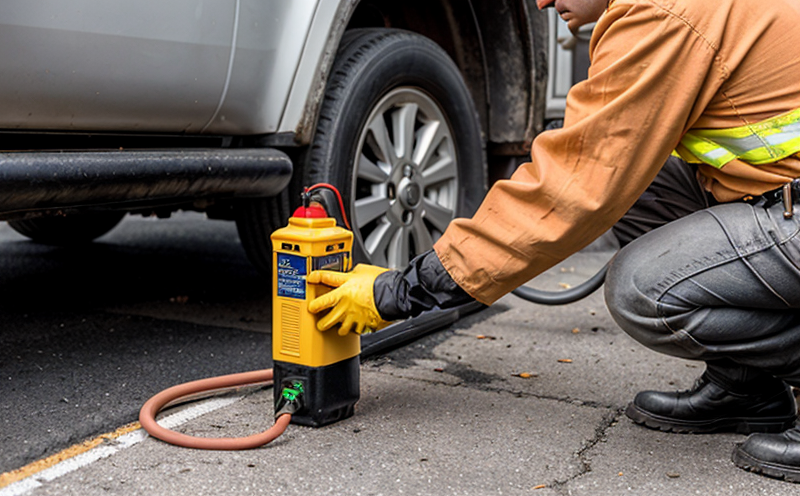Combustible gas detector inspection
In the realm of fire safety and protection systems, combustible gas detectors play a pivotal role. These devices are responsible for monitoring and detecting hazardous levels of flammable gases in industrial environments. Properly functioning detectors ensure that potential risks are identified early, thus preventing catastrophic incidents such as explosions or fires.
The inspection process involves thorough evaluation to confirm the accuracy, reliability, and compliance of these detectors with established standards. This service is crucial for industries like petrochemicals, manufacturing, and utilities where even minor negligence can have severe consequences. The inspection typically includes a series of tests that simulate real-world conditions under which the detector would operate.
The testing process begins with visual inspections to ensure there are no visible signs of damage or wear. Following this, functional checks are conducted using calibrated gas mixtures. These tests assess the instrument's ability to accurately measure and respond to different concentrations of combustible gases. Calibration is a critical aspect as it ensures that any readings taken by the detector are accurate.
The inspection also includes verification of alarm settings and response times. This is essential for ensuring that in the event of an emergency, the detector can promptly alert personnel to take necessary actions. Additionally, the service involves checking the detector's communication capabilities with other systems within the facility. Ensuring seamless integration helps in maintaining a coordinated safety system.
Another important component of the inspection is evaluating the detector's durability and environmental resistance. This includes testing how well it can withstand harsh conditions such as temperature fluctuations, humidity, and dust. The robustness of these detectors is crucial for their long-term reliability in challenging industrial settings.
The results of these inspections are detailed in comprehensive reports that provide a clear picture of the detector's performance. These reports serve multiple purposes including compliance verification, identifying areas for improvement, and supporting decision-making processes within the organization. By adhering to rigorous testing protocols, we ensure that our clients receive accurate data which can be used to enhance safety measures across their facilities.
Regular inspections are vital not only for maintaining regulatory compliance but also for safeguarding employee health and ensuring operational continuity. Investing in reliable detection equipment and regular maintenance is key to building a safer work environment and reducing the risk of accidents. Our expertise lies in providing robust inspection services that meet stringent quality standards, thereby contributing significantly towards enhancing fire safety protocols.
Applied Standards
| Standard | Description |
|---|---|
| ISO/IEC 17025:2017 | International standard for the competence of testing and calibration laboratories. |
| American Petroleum Institute (API) RP 569 | Recommended practice for natural gas processing plants including combustible gas detection systems. |
| European Standard EN ISO 13463-2:2017 | Performance requirements and test methods for fixed gas detectors used in industrial safety applications. |
| IEC 62685:2019 | Specifically covers the performance, test methods, and marking of portable combustible gas detectors. |
Customer Impact and Satisfaction
The importance of reliable combustible gas detection cannot be overstated. Our clients benefit significantly from our comprehensive inspection services which go beyond mere compliance checks to deliver enhanced safety standards. By leveraging advanced testing techniques, we ensure that every detector meets the highest levels of accuracy and reliability.
Our rigorous inspection processes not only help maintain regulatory adherence but also contribute towards creating safer working environments. This is particularly beneficial for industries where even small errors could lead to major incidents. Through our services, we enable businesses to build trust with both internal stakeholders as well as external partners by demonstrating a commitment to safety and quality.
Customer satisfaction forms the cornerstone of our operations. We strive to exceed expectations through meticulous attention to detail during each inspection process. Our team comprises highly skilled professionals who possess deep knowledge about fire protection systems and their applications. This ensures that we provide precise evaluations tailored specifically to meet individual client needs.
We regularly receive positive feedback from satisfied customers who appreciate our thorough approach towards ensuring the integrity of combustible gas detection equipment. Their trust in us is a testament to our dedication towards delivering exceptional services that contribute meaningfully towards enhancing fire safety across various sectors.
International Acceptance and Recognition
The significance of reliable combustible gas detection extends far beyond national borders. Our inspection services are internationally recognized, ensuring that our clients remain compliant with global standards. This recognition is a reflection of the high quality and accuracy provided by our team.
Our adherence to international norms such as ISO/IEC 17025:2017 guarantees consistency in our testing methodologies across different regions. The American Petroleum Institute (API) RP 569 provides specific guidelines for natural gas processing plants which we meticulously follow during inspections. Similarly, European standards like EN ISO 13463-2:2017 and IEC 62685:2019 are integral parts of our testing protocols.
The universal acceptance of these standards underscores the importance placed on maintaining safety measures across diverse industrial settings. By aligning ourselves with such recognized frameworks, we ensure that our clients receive consistent and reliable results regardless of location. This global recognition further strengthens our reputation as a leading provider in fire protection systems inspection services.





